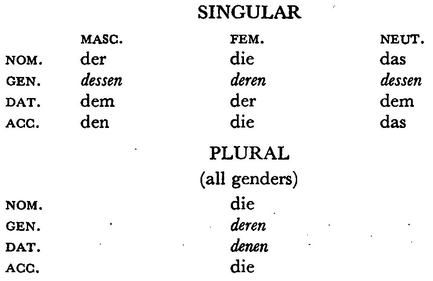Pronouns
Personal Pronouns
The German personal pronouns are used in much the same way as in English, and to a certain extent correspond to them in form. We shall give only the nominative, dative, and accusative forms. (See p. 113 for the concept and use of cases.)

Note that Sie, the polite form for you, is capitalized in all cases. Memorize these forms, for they are very important.
Pronouns follow the same rules for cases as nouns do. The following sentences, which we shall analyze briefly, will demonstrate the use of case.
Können Sie mir ein Zimmer geben, wo ich meinen Hund mitnehmen darf?
[Can you to me a room give, where I my dog take-along may?]
Can you give me a room where I may take my dog along?
Sie is in the nominative since it is the subject of the first clause.
können is plural because Sie always takes a plural verb.
mir is dative, since it is the indirect object of geben, to give.
ich is nominative, since it is the subject of the second clause.
Wenn noch Briefe fur mich ankommen, senden Sie sie mir bitte nach Karlstadt.
[If any letters for me arrive, send you them to me please to Karlstadt.]
If any letters come for me, please send them on to me in Karlstadt.
mich is accusative because the preposition fur takes the accusative.
Sie is nominative since it is the subject of senden.
sie is accusative since it is the direct object of senden.
mir is dative because it is the indirect object of senden.
Ich bin es.
[I am it.]
It is I.
Ich is nominative as the subject of bin. (Observe also that the German reverses the order of words from the English idiom.)
How to Say “you”
In ordinary conversation, the pronoun Sie (including its dative form, Ihnen) is normally used for you. It always takes a plural verb, whether you are addressing one person or many. It is always capitalized.
Ich danke Ihnen für Ihre Gefälligkeit.
I thank you for your kindness.
Ihnen is dative, since danken (to thank) is one of a group of verbs that take a dative form for an object.
Ihre is a pronoun-adjective meaning your. (See p. 28.) It is also capitalized.
As you probably know from German songs, such as “Du, du liegst mir im Herzen,” there is another word meaning you in German. This is du (dative, dir; accusative, dich). Its plural is ihr (dative and accusative,euch). Du and ihr are used between intimate friends, members of the family, with children, and sometimes as an insult. You should learn to recognize these forms when you hear them, but we advise you not to use them until you know enough German to know which situations call for them.
Relative Pronouns
The most frequently used relative pronoun is very much like the definite article, der-die-das. As the following table shows, the two series of forms differ in only five “long forms” from the comparable forms of der-die-das.

The second most common relative pronoun is welcher,5 which is conjugated like the “der-word,” dieser (see p. 27), except that there are no genitive forms. For genitive forms, you have to use the corresponding forms of der-die-das, that is, dessen, deren, dessen, deren.
As a general rule, relative pronouns have the same gender and number as the words they stand for, but their case is determined by their function in the sentence. Note especially the examples and the explanations below:
Der Reiseführer, der (or welcher) uns die Stadt zeigt . . .
[The guide, who us the city shows. . .]
The guide who shows us the city. . .
Der Reiseführer, dessen Adresse wir haben wollen, spricht Englisch.
[The guide, whose address we have want, speaks English.]
The guide, whose address we want to have, speaks English.
Der Reiseführer, dem (or welchem) ich ein gutes Trinkgeld gegeben habe . . .
[The guide, to whom I a good tip given have. . .]
The guide, to whom I gave a good tip. . .
Der Reiseführer, den (or welchen) ich Ihnen empfehlen kann, heisst Karl Laun.
[The guide, whom I to you recommend can, is called Karl Laun.]
The guide, whom I can recommend to you, is called Karl Laun.
In all of the above sentences, the relative pronouns are masculine singular, because der Reiseführer, to which they refer, is a masculine singular noun.
In the first sentence, der (or welcher) is nominative, because it is the subject of the dependent clause der uns die Stadt zeigt.
In the second sentence, dessen is genitive because it indicates possession of Adresse: the expected genitive form of welcher cannot be used, as has been explained above.
In the third sentence, dem (or welchem) is dative as the indirect object of the verb gegeben habe.
In the fourth sentence, den (or welchen) is accusative as the direct object of the verb empfehlen.
You will observe that this use of case closely parallels English.
Word Order after Relative Pronouns
As is explained in the section on word order (p. 87), clauses that are introduced by a relative pronoun require the verb last construction. In such cases all the verbs go to the end of the clause, with the working verb at the very end. In such clauses separable verbs (see p. 75) do not split into their components, but remain unified.
Die Strassenbahn, die nach dem Schloss fährt, ist Linie drei.
[The streetcar, which to the castle travels, is number three.]
The streetcar which goes to the castle is number three.
Das Auto, welches wir gestern gemietet haben, ist ein Volkswagen.
[The auto, which we yesterday rented have, is a Volkswagen.]
The auto which we rented yesterday is a Volkswagen.
In the first sentence, die is feminine singular because it refers to die Strassenbahn, which is a feminine noun.
In the second sentence, welches is neuter because it refers to das Auto, a neuter noun.
Interrogative Pronouns
The interrogative pronouns wer and was are declined as follows:

The missing dative forms of the neuter was are supplied by such combinations as womit (with what), worauf (on what), woran (about what), wodurch (through what), and worum (about what).
| Wer hat ein Auto? | Was hat er gesagt? |
| Who has a car? | [What has he said?] |
| What did he say? | |
| Wessen Auto ist das? | Womit fahren Sie? |
| Whose car is this? | [With what travel you?] |
| How will you travel? | |
| Wem haben Sie meinen Pass gegeben? | Worauf warten Sie? |
| [On what wait you?] | |
| [To whom have you my passport given?] | For what are you waiting? |
| To whom have you given my passport? |
Wen haben Sie in Frankfurt gesehen?
[Whom have you in Frankfurt seen?]
Whom did you see in Frankfurt?